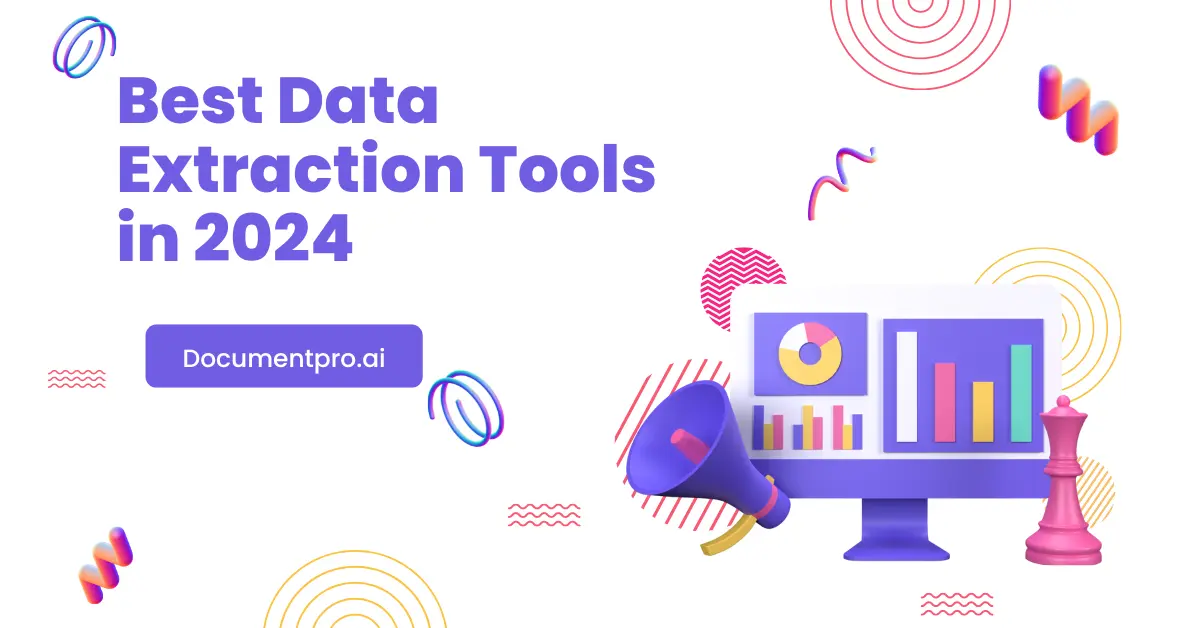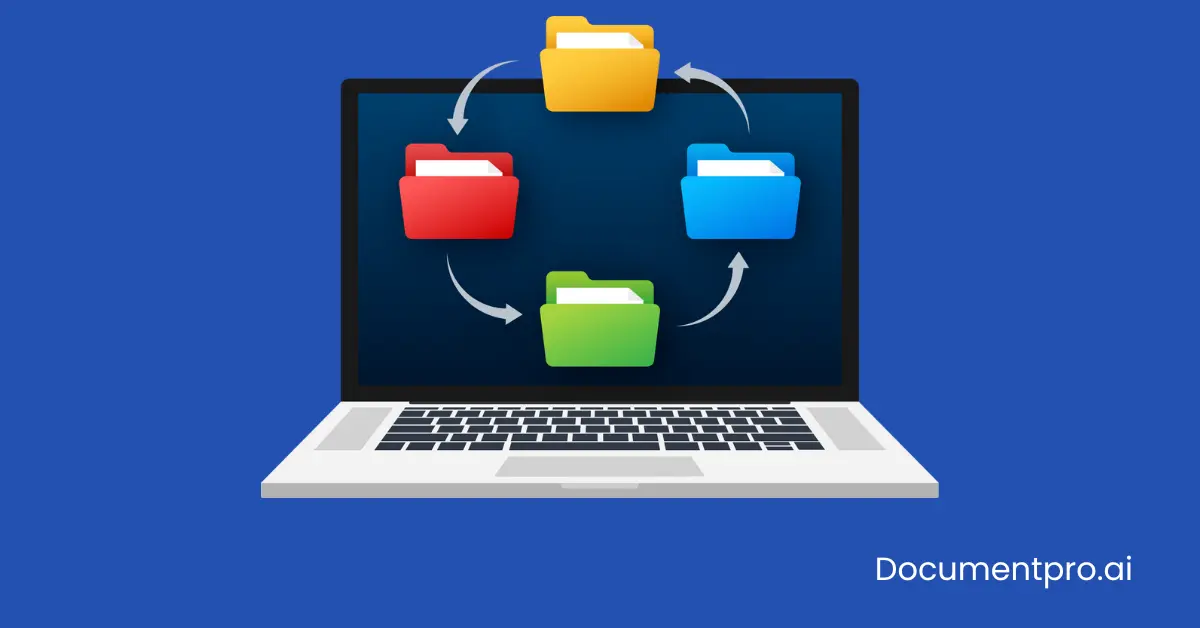
In today's fast-paced digital world, data extraction has become an essential task for businesses, researchers, and professionals across various industries. The ability to efficiently extract data from multiple sources, whether it's web pages, PDFs, or other documents, can significantly impact decision-making processes and operational efficiency.
This article will explore the top 5 best data extraction tools available today, starting with DocumentPro, a standout tool in this field.
What is Data Extraction?
Data extraction refers to the process of retrieving specific data from unstructured or poorly structured sources for further processing. This is crucial for businesses, researchers, and analysts who need to quickly and accurately analyze large volumes of information.
Use Cases in Various Industries
Data extraction plays a pivotal role across different industries:
- Finance: Extracting financial reports and data for analysis.
- Healthcare: Pulling patient data from various forms.
- E-commerce: Scraping product data for price comparison and market analysis.
- Marketing: Gathering customer insights from social media and other sources.
Key Features to Look for in Data Extraction Tools
When choosing a data extraction tool, several key features should be considered:
- Accuracy and Precision: The tool must extract data with minimal errors.
- Ease of Use: A user-friendly interface is vital, especially for non-technical users.
- Compatibility with Multiple Data Sources: The tool should handle various formats like HTML, PDFs, and databases.
- Scalability: The ability to manage both small and large datasets efficiently.
- Data Security: Compliance with data privacy regulations is a must.
The Criteria for Selecting the Top 5 Data Extraction Tools

To determine the top 5 data extraction tools, we evaluated user reviews, features, cost, ease of use, and overall performance. Here's an in-depth look at each tool, starting with DocumentPro.
Tool 1: DocumentPro | Best Data Extraction
DocumentPro is an advanced AI-powered data extraction tool that excels at handling complex document types. It is a top choice for various industries, particularly in healthcare, finance, and legal sectors. Launched to address the growing need for accurate and efficient data extraction, DocumentPro has quickly become a trusted tool for professionals worldwide.
Key Features
- Advanced OCR Technology: DocumentPro uses Optical Character Recognition (OCR) to accurately extract text from scanned documents, PDFs, and images.
- Target specific pages within documents
- Focus on particular content using regex patterns
- Extract facts, tables, and repeating data structures
- Apply multiple parsers to a single document for comprehensive analysis
- No need for time-consuming model training
Pros and Cons
Pros:
- Highly accurate data extraction.
- Supports a wide range of document formats.
- Secure and compliant with data privacy laws.
Cons:
- Premium features come at a higher cost.
Pricing Structure
DocumentPro offers a range of pricing options, including a free trial. Paid plans start at $9/month. Document pricing is credit-based, so you can buy the credit package according to your document processing volume.
Ideal Use Cases
DocumentPro is perfect for organizations that require precise and secure data extraction from various document formats, particularly in industries like healthcare, finance, and legal services.
Tool 2: ABBYY FlexiCapture
ABBYY FlexiCapture is a powerful data capture and document processing solution. Known for its advanced OCR technology, ABBYY has been a leader in the data extraction industry for decades.
Key Features
- Advanced OCR and data capture.
- Handles complex document layouts.
- Supports multiple languages and document types.
- Integration with third-party systems like ERP and CRM.
Pros and Cons
Pros: Highly accurate, supports a wide range of document types, scalable.
Cons: Expensive for small businesses requires some technical knowledge to set up.
Pricing Structure
Free plan available with limitations. Paid plans start at $119/month.
Ideal Use Cases
Perfect for businesses that need to extract large amounts of data from the web without writing code.
Tool 3: DocParser
DocParser is a web-based document data extraction tool designed to convert PDFs and scanned documents into structured data. It's particularly popular for extracting data from invoices and
Key Features
- Custom parsing rules for different document types.
- Automated data extraction and integration with cloud services.
- User-friendly interface with no coding required.
- Supports various document formats like PDFs, Word, and Excel.
Pros and Cons
Pros: Easy to set up, integrates with cloud platforms (like Zapier), affordable.
Cons: Limited to PDF and certain document types, may struggle with highly complex layouts
Pricing Structure
Starts at $32/month with a free trial available.
Ideal Use Cases
Ideal for small to medium-sized businesses needing to extract data from standardized documents like invoices and receipts.
Tool 4: Adobe Acrobat DC
Adobe Acrobat DC is a well-known PDF solution with robust data extraction capabilities. Its long history in document management makes it a trusted choice for many users.
Key Features
- Batch processing of multiple documents.
- Integration with Adobe Cloud and other services.
- OCR for converting scanned documents into editable text.
Pros and Cons
Pros: Reliable, supports batch processing, integrates well with other Adobe products.
Cons: The subscription model can be expensive and more suited for PDFs than other formats.
Pricing Structure
Subscription starts at $14.99/month for individuals, with business pricing available.
Ideal Use Cases
Best for professionals and businesses that primarily work with PDFs and need a reliable, well-integrated solution.
Tool 5: ParseHub | Free Data Extraction Tool
ParseHub is another popular web scraping tool that converts website data into structured data sets. Founded in 2014, it offers powerful features while being accessible to non-programmers.
Key Features
- Visual data extraction interface.
- Supports AJAX and JavaScript-heavy websites.
- Cloud-based and desktop versions are available.
Pros and Cons
Pros: Handles complex websites, easy-to-use interface, cloud support.
Cons: Limited free plan, slower processing times for large projects.
Pricing Structure
Free plan with limited features. Paid plans start at $189/month.
Ideal Use Cases
Great for users who need to scrape complex web pages without coding.
Tool 6: OutWit Hub | Fee Web Scraping
OutWit Hub is a versatile data extraction tool that has been around since 2008. It offers a wide range of features for extracting, sorting, and organizing data.
Key Features
- Automatic data structure recognition.
- Built-in scraper for images and documents.
- Extensive customization options.
Pros and Cons
Pros: Highly customizable, good for both simple and complex tasks.
Cons: Steeper learning curve, outdated interface.
Pricing Structure
Free version available. Paid plans start at $59/month.
Ideal Use Cases
Suitable for users who need a highly customizable tool with advanced features.
Summary Comparison of Top Data Extraction Tools
-
ABBYY FlexiCapture Features: Advanced OCR, scalable Price: Custom Pricing Best For: Large enterprises
-
DocParser Features: Web-based, cloud integrations Price: $32/month Best For: Small to medium-sized businesses
-
Adobe Acrobat DC Features: OCR, batch processing Price: $14.99/month Best For: PDF-centric workflows
-
Rossum Features: AI-driven extraction, customizable Price: Custom Pricing Best For: High-volume invoice processing
-
Kofax Power PDF Features: Comprehensive PDF management, secure Price: $129/license Best For: Businesses needing robust PDF tools
-
DocumentPro Features: AI-powered, OCR, secure data handling Price: $9/month Best For: Healthcare, finance, legal
-
Octoparse Features: No coding, cloud-based Price: $119/month Best For: Large-scale data extraction
-
OutWit Hub Features: Customizable, wide feature set Price: $59/month Best For: Advanced users
How to Choose the Right Data Extraction Tool for Your Needs
Identifying Your Specific Requirements
Start by defining what you need from a data extraction tool. Are you looking to scrape web data, extract from PDFs, or pull data from APIs?
Matching Features to Needs
Ensure the tool you choose has features that align with your requirements, such as ease of use, scalability, and security.
Budget Considerations
Consider your budget and the tools' pricing structure. Free versions may offer limited features, while paid plans provide more comprehensive solutions.
Benefits of Using Data Extraction Tools
Time-Saving
These tools automate the data extraction process, saving you hours of manual work.
Increased Accuracy
They reduce human errors, ensuring that the data you collect is accurate and reliable.
Enhanced Decision-Making
With the right data at your fingertips, you can make more informed decisions that drive your business forward.
Conclusion
Selecting the right data extraction tool is crucial for efficiently managing and analyzing data. Whether you choose DocumentPro for its advanced AI capabilities or another tool like Octoparse or Import.io, the key is to match the tool's features with your specific needs and budget.
By doing so, you'll be well-equipped to handle the data challenges of today's digital landscape.
FAQs
1. What is the best data extraction tool for healthcare?
DocumentPro is the best choice for healthcare due to its AI-powered extraction and compliance with data privacy regulations.
2. Can these tools handle handwritten documents?
Tools like ABBYY FlexiCapture and Rossum have advanced OCR capabilities that can handle some handwritten text, but accuracy can vary depending on handwriting quality.
3. How secure are document data extraction tools?
Most professional-grade tools, such as Kofax Power PDF and ABBYY FlexiCapture, offer robust security features, including data encryption and compliance with data privacy regulations.
Getting Started with DocumentPro
You can start with DocumentPro for free. DocumentPro provides 10 free credits per month to test out extractions, allowing you to experience its powerful data extraction capabilities firsthand.
